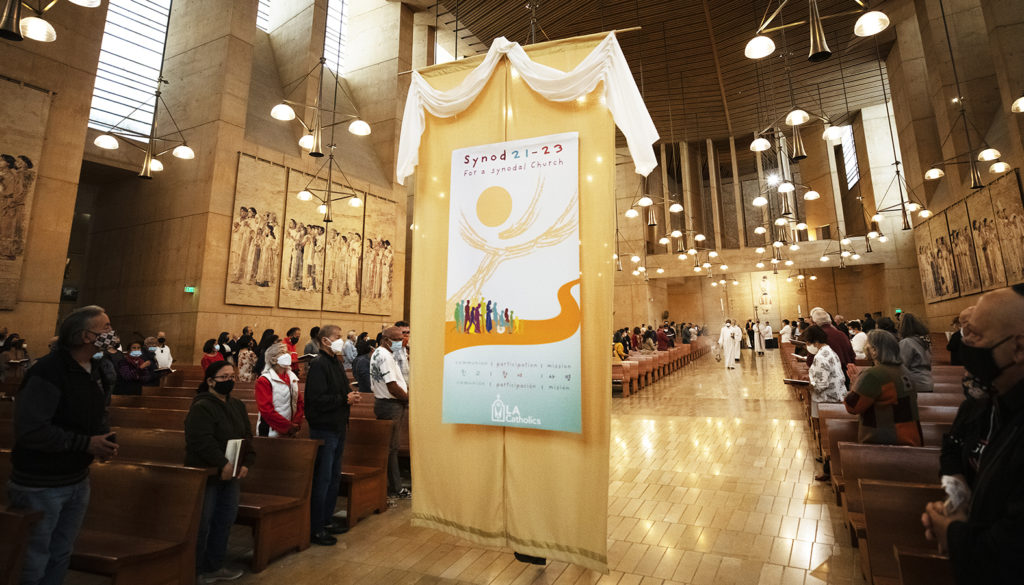The Archdiocese of Los Angeles has a long history of participation by the lay faithful in the life and mission of the local Church.
In 2000, my predecessor, Cardinal Roger Mahony, called for a synod, beginning a three-year process that concluded with the publication of a series of proposals and pastoral initiatives published in a document called “Gathered and Sent.”
Day to day, the extensive collaboration and participation of the lay faithful are carried out in the workings of the Archdiocesan Pastoral Council and in the pastoral and financial councils in our parishes.
In the last two years, we have deepened and intensified our experience of collaboration as we prepare for the synod of the world’s bishops that Pope Francis has called to be held in Rome, Oct. 4–29.
Nearly 19,000 of our brothers and sisters, including many young people, took part in our local preparations for the synod, which included consultation and listening sessions held across the archdiocese.
All told, we held more than 500 listening sessions in 158 parishes and 19 communities from January to April 2022.
These meetings were prayerful and fruitful, and from the hundreds of session reports, we delivered our archdiocesan report to the Vatican’s synod office.
The theme of the upcoming Synod is “For a Synodal Church: Communion, Participation, and Mission.”
And the purpose is to lead all of us in the Church, clergy, religious, and the lay faithful, to a new appreciation of our responsibility for the Church’s mission of bringing all souls to know Jesus Christ and his salvation.
In these days and weeks after Easter, we hear the readings of the Acts of the Apostles.
It is always striking to remember that from the very start, the Church was united — the mother of Jesus, the apostles, the first bishops and priests, with the deacons they appointed, and faithful laymen and holy women, all working together to spread the good news of Jesus.
I love that beautiful image of the Church in Acts 2. In that reading we see the Church is like a family that cares for one another, providing for “each one’s need.”
Then, as now, the Church is united by “the teaching of the apostles,” which we have in the word of God, and the “breaking of the bread,” which was the first name for the Eucharist.
What we also notice in the Acts of the Apostles is how often the first Christians shared the Gospel personally, heart to heart. St. Peter converted Cornelius; St. Philip baptized the Ethiopian.
It was the same with Jesus. The Gospel is the story of one soul after another meeting Jesus, and finding in him the true direction for their lives. Think of the woman at the well or Zacchaeus in the sycamore tree.
The first Christians were just 11 apostles, the Blessed Virgin Mary, and holy women like St. Mary Magdalene. The world around them was cold and filled with idolatry, inhumanity, and injustice. As St. Paul said when he was in Athens: the people in those times had many gods, they were very “spiritual.” But the living God, the Lord of heaven and earth, remained unknown to them.
And yet by loving Jesus and living their faith in their families and in their workplaces and neighborhoods, and sharing their faith with their neighbors, that small group of Christians eventually grew and converted the entire Roman Empire. Without an army and without violence, they changed the world through their love.
To me, this is the promise of what the Holy Father calls “the synodal path,” returning the Church to our original calling purpose, which is the mission of evangelization.
The Church is alive in all of us — bishops and priests, deacons and seminarians, religious and consecrated men and women, laymen and laywomen from all walks of life.
And we share in that same mission as those first Christians, to make Jesus known and loved, and through him to help our neighbors find the way that will lead them to eternal life and the love that never ends.
This is our responsibility and opportunity, no matter who we are or what our role in the Church is. And this mission is so important today.
Many people in our society, even in our own families, have drifted away from God or the Church. These people are waiting for a new invitation to meet Jesus again. They are waiting for that invitation from you and me.
Pray for me and I will pray for you.
And let us ask Blessed Mary, mother of the Church, to help us grow in our love for her Son and our desire to speak of that love to everyone we meet.

